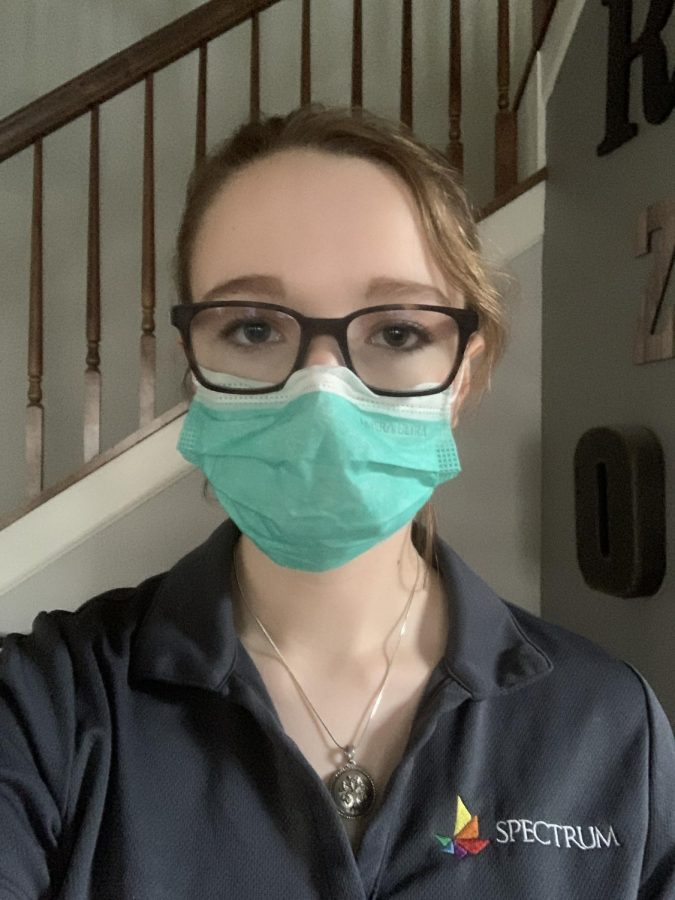My life as an unexpectedly essential worker
If somebody had told me six months ago when I applied to become a waitress at an assisted living home that I would become an “essential” worker, I wouldn’t believe you. Six months ago, I thought an essential worker meant being a first responder or a healthcare worker. But as of this past month, grocery store employees, food service workers, and other professions one wouldn’t consider to be as important as healthcare have been designated as “essential” people.
As a waitress at a nursing home, I am far from the front lines and deserve none of the same praise as our doctors, nurses, grocery clerks, first responders, and other professions who interact with potentially infected people daily. But working with a high-risk population definitely brings about its own challenges and sacrifices.
For starters, our entire facility is in complete isolation. This means that unless you are an employee, you are not allowed into the building. Even delivery drivers have to leave packages outside, where the receptionist must disinfect it and ensure it is safe to bring it inside. For the employees, this means sanitizing our hands, wearing our masks, taking our temperature, and having said temperature confirmed that it is within the normal range all before having the doors unlocked. Once we are allowed in, we sanitize our hands again, sign in, and then begin our shift.
Everyone has to work as a team in order to ensure the residents are safe and healthy, but being a part of the kitchen means we have to take more precautions than others. We wear and dispose of gloves constantly, especially when changing tasks such as dishing out soup and preparing desserts. We have gradually shifted toward disposable and premade foods to ensure less direct contact. However, this means our break room is entirely packed with boxes stacked up to the ceiling. Just trying to grab a box of pre-packaged silverware is like playing a life-sized game of Jenga, except when they topple over it becomes an avalanche of cardboard boxes.
When we deliver food, we have it all stacked on carts and bring it to the corresponding floor. It can get hectic when separating meals, especially when we are shorthanded. Thankfully, our nurses, caretakers, and activities directors have been stepping up to help us out. Because activities directors and servers aren’t allowed in the apartments or to come in direct contact with the residents themselves, only the nurses and caretakers can deliver the food directly. And with only two nurses or caretakers to a hall, it can be very time-consuming and exhausting work. Not to mention when people change their minds last minute, meaning we have to make several trips back and forth between the kitchen and floors. As tedious as these extra precautions can be, they are necessary to have in place in order to ensure that everyone remains safe and healthy.
Thankfully, our facility is virus-free and there isn’t any real danger as long as the facility is regulated and workers are only coming in when healthy. The biggest concern is making sure the virus has no way in, which is why we take so many precautions. While we have gloves, hand sanitizer, and soap to last us for a long while, the real issue is masks. The nurses and caretakers rightfully have the N-95 masks as they are the only ones who come in direct contact with the residents, but that leaves the rest of the facility with regular masks we have to reuse each shift. Even then, some get dirty or lost. The extras we have are few and far between, but with so many other establishments such as hospitals needing them more, we don’t have much say in the matter.
Being in isolation also means the residents are not allowed out of their rooms or have direct outside contact, even with family members. Some handle this better than others, as you can imagine. As somebody who genuinely enjoys interacting with them and looks forward to hearing their stories, it can be tough not being able to even go up to their door to say hello. At most, I can say hello in passing if they happen to go up to their door the same time I’m walking by, but I can’t engage in any real conversation. That’s why it’s important that we check in with our older relatives. Even if it’s a five-minute phone call, I can guarantee it’ll make their day.
Even though my job has gotten a lot more complicated, I am still grateful to have it when I know some people have lost theirs. I know that what I’m doing isn’t very big or exciting, but it’s something I can take pride in, knowing I’m still helping others in any way I can. The sacrifices we have to make are what keep our residents and loved ones safe. That’s why it’s important that we, as a community, follow the stay-at-home orders. It’s not only to protect ourselves, but those who are a part of the high-risk population who don’t have the choice of staying inside and being safe.

